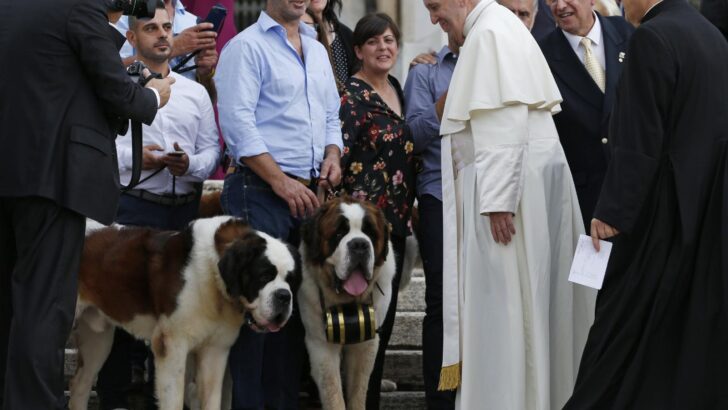The Irish sisters using goats and donkeys to cheer up the residents of a nursing home in Dublin are just the latest example of the unique relationship between the Church and the animal kingdom.
Mount Sackville Nursing Home in Dublin has been making waves this week after the Sisters there revealed that key to their care are two donkeys, a pygmy goat, who just gave birth to two kids, a sheep, and a service dog.
So this seemed an ideal time to answer some of the most common questions about Catholicism and our furry friends.
What Does the Catechism of the Catholic Church Say About Animals?
The Catechism states that the seventh commandment enjoins respect for the integrity of creation. “Animals, like plants and inanimate beings, are by nature destined for the common good of past, present, and future humanity. Use of the mineral, vegetable, and animal resources of the universe cannot be divorced from respect for moral imperatives. Man’s dominion over inanimate and other living beings granted by the Creator is not absolute; it is limited by concern for the quality of life of his neighbour, including generations to come; it requires a religious respect for the integrity of creation.”
This imposes limits on humanity’s interaction with the animal world, particularly regarding cruelty towards animals, which is also clearly stated in the Catechism: “Animals are God’s creatures. He surrounds them with his providential care. By their mere existence they bless him and give him glory. Thus men owe them kindness. We should recall the gentleness with which saints like St Francis of Assisi treated animals.”
It continues: “It is contrary to human dignity to cause animals to suffer or die needlessly. It is likewise unworthy to spend money on them that should as a priority go to the relief of human misery. One can love animals; one should not direct to them the affection due only to persons.”
What’s the Deal with St Francis and Animals?
St Francis of Assisi is the patron saint of animals. He saw animals as his brothers and sisters and prayed that God would work through him to help them. One story says that when he lived in Gubbio, in the province of Perugia, a wolf was attacking people and other animals. He met the wolf to try to tame it. The wolf charged Francis, but Francis prayed and moved toward the wolf. The wolf obeyed Francis’ commands, closing his mouth and lying at Francis’ feet. Francis promised that the townspeople would feed the wolf regularly if it promised never to injure another person or animal. The wolf never harmed people or animals again.
St Francis is the patron saint of animals, and his Franciscan order is famous for its care for animals and even had a canine member.
Have Any of the Popes Had Pets?
The current rules of Vatican City do not permit any animals to live within the papal palace. This would surprise many past popes, who have kept everything from kittens to elephants on Vatican Hill. Pope Benedict was a great fan of cats, a fact which inspired a popular series of books. But the most famous papal pet was Hanno the elephant, owned by Pope Leo X (1513–1521). Hanno was given to the Pope by King Manuel I of Portugal as a consecration gift and an attempt to gain papal support for Portugal’s ambitions in trade and exploration.
The elephant entered Rome in a grand procession. When Hanno greeted the Pope, he kneeled, trumpeted from his trunk, and then, on command of his trainer, he filled his trunk with water from a trough and sprayed the Pope, the cardinals, and the spectators. Pope Leo was thrilled. He was captivated by his new pet, but sadly, it passed away just two short years later.
Does Pope Francis Hate Dogs?
No, but he did spark controversy in 2022 when he suggested people who choose to have pets over children are acting selfishly. The Pope’s comments came as he was discussing parenthood during a general audience at the Vatican in Rome. “Today… we see a form of selfishness,” he told the audience. “We see that some people do not want to have a child. Sometimes they have one, and that’s it, but they have dogs and cats that take the place of children. This may make people laugh, but it is a reality.”
Can My Cat Have a Catholic Funeral?
No. The Catholic Archbishop of Freiburg, Germany, Stephan Burger, laid out the position last year. “I am clearly in favour of an ethically responsible treatment of animals and am concerned about animal welfare. But we should not humanise animals. A Catholic mourning rite specifically for pets is unthinkable.”
Can Dogs Go to Heaven?
Unlikely. The question of animals in the afterlife has sparked many theological arguments, but there isn’t a definite answer. The Church has no official teaching on the matter of pets entering heaven, but there are theological principles that can direct us to the most probable answer.
Catholics believe that all living things have souls, including not only humans but also plants and animals. When a living thing dies, the soul separates from its body or organic makeup. In the case of animals, the soul goes out of existence. However, the souls of human beings are radically different from the souls of other living things. Whereas the souls of animals are contingent upon their material makeup, human souls remain in existence after death because they are immaterial.
This means that human souls can’t be destroyed and are immortal. Animals’ souls, however, are not.
Can Catholics Be Vegan?
It is morally permissible and, in some contexts, probably praiseworthy, but not required. Some of the arguments currently used in support of the practice are inconsistent with Catholic teaching on the role of humans and our relationship to other animals.


 Ian Dunn
Ian Dunn Pope Francis greets dog owners during his general audience in St. Peter's Square at the Vatican in this Sept. 19, 2018, file photo. Photo: CNS photo/Paul Haring
Pope Francis greets dog owners during his general audience in St. Peter's Square at the Vatican in this Sept. 19, 2018, file photo. Photo: CNS photo/Paul Haring